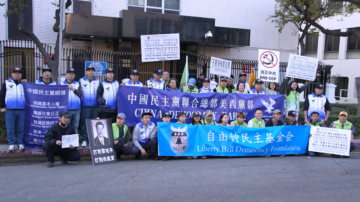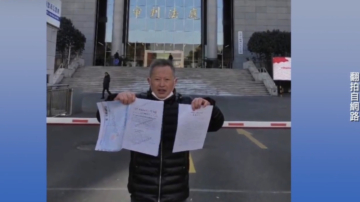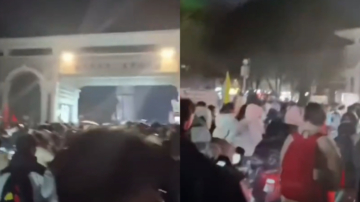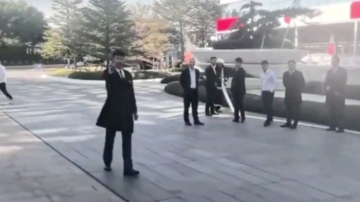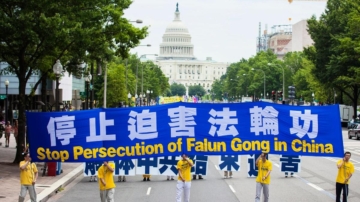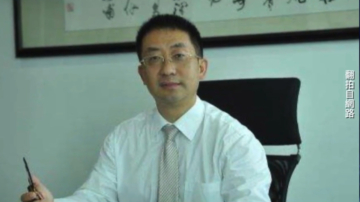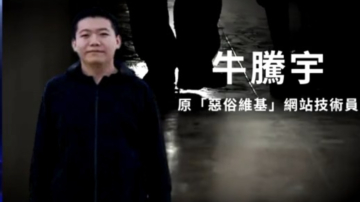【新唐人2013年10月09日訊】今年以來,大陸各地民眾大規模向政府示威抗議的事件不斷,抗議原因9成以上與當局強拆房屋、強佔土地、和政府官員貪腐不作為有關。抗議方式包括靜坐、遊行甚至打砸圍攻。民眾表示,在維權通道被堵死、官官相護、法律形同虛設的情況下,走投無路的百姓唯有被迫起來反抗。而評論認為,隨著中共剝削的加重與民心的背離,「官逼民反」的現象還會進一步加劇,最終席捲全中國。
今年下半年,大陸廣東、廣西、河南、河北、四川、安徽、福建等地,相繼爆發了大規模民眾圍堵政府的事件。
據《自由亞洲電臺》報導,廣東省惠東縣稔山鎮稔石村的近百村民,10月3號開始,連續3天舉行遊行示威。村民打著「打倒腐敗,打倒貪官,偷賣土地」的橫幅,沿路喊著口號抵達鎮政府。村民們抗議村委假冒村民簽字,私賣山地牟利,並且抗議縣和鎮政府包庇貪腐村官。
廣東省惠東縣稔山鎮稔石村臨村村民:「幾年前我們村民的山給它賣了嘛,給它政府偷賣了,現在就找它討回來,它們不給啊!反映了,他們說是歷史存留的問題,他們村民不滿意呀,在圍堵政府。」
10月5號晚,廣東當局以「非法集會」的理由,派出大批特警到現場強力清場,抓走了幾位所謂「領頭」的村民。
山東濰坊網友質問當局:「有合法的集會嗎?」
河南網友說:「唱讚歌的集會合法,但是沒有人去,人們想去表達真實意願的集會,你說不合法!」
廣東省惠東縣稔山鎮稔石村臨村村民:「聚會?肯定搞到我們農村的地給我們賣了,肯定得去找理,找不到,我們肯定要聚會了,聚會去找回來,討回公道啊!公道都沒人還給我們,我們怎麼去找啊?農村裡面討回公道難申訴的。我們朝廷裡面沒官,只能給政府逼呀!」
與廣東情況相似的是,廣西恭城縣政府在3號也遭到了民眾圍堵,恭城縣蓮花鎮湖裡村的上百村民在縣政府門口靜坐示威,並將申訴材料貼滿政府門口,抗議村官截留侵吞公益林補貼款十幾年,以及中共警察進村毆打和抓捕村民的暴行。
據了解,「十一」前夕,當地村民已經與警察發生了衝突,連續兩天近30輛警車闖入村中施暴,造成30多名村民被毆打致傷,一名八旬老人生命垂危。
此外,10月1號,河北省定州市支白土村,也發生了數百村民圍堵打砸當地村委會,抗議強徵土地事件﹔9月,河南省焦作上千民眾包圍政府,抗議當局官商勾結騙取百姓血汗錢﹔8月,安徽省宣城市荊州鄉政府被上千村的村民圍攻,抗議政府抗旱不力,私吞抗旱物資。由於村民向當地官員討說法沒有結果,憤怒的村民將辦公大樓門窗砸毀,數輛車被砸毀掀翻,多名政府官員被圍毆﹔7月,廣州番禹上千村民佔領村委會,集體簽名罷免現任村書記,抗議村官貪腐、私自出租土地等等,諸如此類的「官逼民反」事件接連在大陸各地上演。
廣東省惠東縣稔山鎮稔石村臨村村民:「搞到我們村民沒地方、無路可逃到時候就會這樣子做啦,最簡單一句,誰有飯吃不想吃飯呢?搞到我們沒飯吃的話,我們就會這樣啦,村民都是這樣,沒辦法。」
群眾事件起因於﹕社會底層為爭取自身權益而與統治階層發生對抗,或因統治階層不當行為觸怒民眾而引發衝突。專家認為,官民持續長時間的對立,會引發大規模衝突,而衝突升級,就會引發政局動盪甚至戰爭,最終導致政權的滅亡。
採訪編輯/張天宇 後製/李勇
Mass Protests Escalate Across China
A series of mass protests have continued in China this year,
taking the form of sit-ins, marches, even physical violence,
with over 90% being linked to forced house demolitions,
land grabs, and corruption.
Devastated citizens say they have been forced to fight
against officials who are abusing people's rights and laws.
The rebellion is believed to soon sweep the nation as friction
escalates between the people and the communist regime.
Since July, mass protests have broken out near surrounding
governmental buildings in provinces such as Guangdong,
Guangxi, Henan, Hebei, Sichuan, Anhui, Fujian, and others.
Radio Free Asia reports that nearly 100 Guangdong villagers
started a three-day demonstration on October 3.
Protesters marched to Huidong County Office with banners
saying: “Down with corruption, down with corrupt officials
who steal our land.”
The county and town governments have ignored the charge
that the village committee sold land using fake signatures.
Villager of Huidong County, Guangdong:
"They sold our mountain a few years ago—they stole it;
we want it back, but they refuse to, claiming it's in the past—
we villagers disagree and so we are surrounding the office."
On Oct. 5, evening, special police from Guangdong arrested
alleged 'village leaders' on charge of "gathering unlawfully".
An internet user in Shandong asked,
"Is there such a thing as a 'lawful gathering'?"
A Henan netizen wrote, "Gathering to praise is 'lawful',
but no one will; then gathering to address issues is unlawful?”
Villager of Huidong County, Guangdong:
"Gathering?—they sold our land, we have to get it back
as they won't return it; we'll get it back our way.”
“We are fighting for justice, otherwise, no one else will do it;
the government has forced us to do this."
Protests also arose on Oct. 3 with over 100 villagers from
Gongcheng County in Guangxi carrying out sit-ins in front of
the government hall, against village officials who have
allegedly embezzled over 10 years of forest subsidies.
Local police violently beat and arrested the villagers.
Prior to Oct 1, conflicts had already broken out between
the villagers and the police.
In two days, 30 police vehicles entered the village,
and more than 30 villagers were injured in clashes,
including an 80-year-old man who is in critical condition.
Multiple mass protests against corrupt officials
have been taking place across China.
Violent protests against forced land grabs which affected
hundreds of locals arose in Hebei on Oct 1.
In September, thousands of Henan locals protested against
collusion between government and businesses.
In August, Anhui villagers protested against
the Jingzhou township for mismanaging drought aids.
Angry villagers smashed town hall windows and vehicles,
and beat several town hall officials.
In July, Guangzhou villagers with thousands of signatures
occupied the secretary's office, requesting the removal
of the secretary for corruption and illegal land leasing.
Villager of Huidong County, Guangdong:
"We've been forced into a dead end—simply put, if we were
left with a way to live, we would not have resorted to this."
The mass protests are mainly based on people fighting for
their personal rights against the ruling class, or arose because
people were offended by the misconduct of the ruling class.
Prolonged opposition between officials and the public
have lead to large-scale conflicts.
Experts believe that the escalating conflicts will lead to
further political instability and even to a war breaking out,
which will subsequently lead to the demise
of the Chinese communist regime.
Interview Edit / Zhang Tianyu Post-production
今年下半年,大陸廣東、廣西、河南、河北、四川、安徽、福建等地,相繼爆發了大規模民眾圍堵政府的事件。
據《自由亞洲電臺》報導,廣東省惠東縣稔山鎮稔石村的近百村民,10月3號開始,連續3天舉行遊行示威。村民打著「打倒腐敗,打倒貪官,偷賣土地」的橫幅,沿路喊著口號抵達鎮政府。村民們抗議村委假冒村民簽字,私賣山地牟利,並且抗議縣和鎮政府包庇貪腐村官。
廣東省惠東縣稔山鎮稔石村臨村村民:「幾年前我們村民的山給它賣了嘛,給它政府偷賣了,現在就找它討回來,它們不給啊!反映了,他們說是歷史存留的問題,他們村民不滿意呀,在圍堵政府。」
10月5號晚,廣東當局以「非法集會」的理由,派出大批特警到現場強力清場,抓走了幾位所謂「領頭」的村民。
山東濰坊網友質問當局:「有合法的集會嗎?」
河南網友說:「唱讚歌的集會合法,但是沒有人去,人們想去表達真實意願的集會,你說不合法!」
廣東省惠東縣稔山鎮稔石村臨村村民:「聚會?肯定搞到我們農村的地給我們賣了,肯定得去找理,找不到,我們肯定要聚會了,聚會去找回來,討回公道啊!公道都沒人還給我們,我們怎麼去找啊?農村裡面討回公道難申訴的。我們朝廷裡面沒官,只能給政府逼呀!」
與廣東情況相似的是,廣西恭城縣政府在3號也遭到了民眾圍堵,恭城縣蓮花鎮湖裡村的上百村民在縣政府門口靜坐示威,並將申訴材料貼滿政府門口,抗議村官截留侵吞公益林補貼款十幾年,以及中共警察進村毆打和抓捕村民的暴行。
據了解,「十一」前夕,當地村民已經與警察發生了衝突,連續兩天近30輛警車闖入村中施暴,造成30多名村民被毆打致傷,一名八旬老人生命垂危。
此外,10月1號,河北省定州市支白土村,也發生了數百村民圍堵打砸當地村委會,抗議強徵土地事件﹔9月,河南省焦作上千民眾包圍政府,抗議當局官商勾結騙取百姓血汗錢﹔8月,安徽省宣城市荊州鄉政府被上千村的村民圍攻,抗議政府抗旱不力,私吞抗旱物資。由於村民向當地官員討說法沒有結果,憤怒的村民將辦公大樓門窗砸毀,數輛車被砸毀掀翻,多名政府官員被圍毆﹔7月,廣州番禹上千村民佔領村委會,集體簽名罷免現任村書記,抗議村官貪腐、私自出租土地等等,諸如此類的「官逼民反」事件接連在大陸各地上演。
廣東省惠東縣稔山鎮稔石村臨村村民:「搞到我們村民沒地方、無路可逃到時候就會這樣子做啦,最簡單一句,誰有飯吃不想吃飯呢?搞到我們沒飯吃的話,我們就會這樣啦,村民都是這樣,沒辦法。」
群眾事件起因於﹕社會底層為爭取自身權益而與統治階層發生對抗,或因統治階層不當行為觸怒民眾而引發衝突。專家認為,官民持續長時間的對立,會引發大規模衝突,而衝突升級,就會引發政局動盪甚至戰爭,最終導致政權的滅亡。
採訪編輯/張天宇 後製/李勇
Mass Protests Escalate Across China
A series of mass protests have continued in China this year,
taking the form of sit-ins, marches, even physical violence,
with over 90% being linked to forced house demolitions,
land grabs, and corruption.
Devastated citizens say they have been forced to fight
against officials who are abusing people's rights and laws.
The rebellion is believed to soon sweep the nation as friction
escalates between the people and the communist regime.
Since July, mass protests have broken out near surrounding
governmental buildings in provinces such as Guangdong,
Guangxi, Henan, Hebei, Sichuan, Anhui, Fujian, and others.
Radio Free Asia reports that nearly 100 Guangdong villagers
started a three-day demonstration on October 3.
Protesters marched to Huidong County Office with banners
saying: “Down with corruption, down with corrupt officials
who steal our land.”
The county and town governments have ignored the charge
that the village committee sold land using fake signatures.
Villager of Huidong County, Guangdong:
"They sold our mountain a few years ago—they stole it;
we want it back, but they refuse to, claiming it's in the past—
we villagers disagree and so we are surrounding the office."
On Oct. 5, evening, special police from Guangdong arrested
alleged 'village leaders' on charge of "gathering unlawfully".
An internet user in Shandong asked,
"Is there such a thing as a 'lawful gathering'?"
A Henan netizen wrote, "Gathering to praise is 'lawful',
but no one will; then gathering to address issues is unlawful?”
Villager of Huidong County, Guangdong:
"Gathering?—they sold our land, we have to get it back
as they won't return it; we'll get it back our way.”
“We are fighting for justice, otherwise, no one else will do it;
the government has forced us to do this."
Protests also arose on Oct. 3 with over 100 villagers from
Gongcheng County in Guangxi carrying out sit-ins in front of
the government hall, against village officials who have
allegedly embezzled over 10 years of forest subsidies.
Local police violently beat and arrested the villagers.
Prior to Oct 1, conflicts had already broken out between
the villagers and the police.
In two days, 30 police vehicles entered the village,
and more than 30 villagers were injured in clashes,
including an 80-year-old man who is in critical condition.
Multiple mass protests against corrupt officials
have been taking place across China.
Violent protests against forced land grabs which affected
hundreds of locals arose in Hebei on Oct 1.
In September, thousands of Henan locals protested against
collusion between government and businesses.
In August, Anhui villagers protested against
the Jingzhou township for mismanaging drought aids.
Angry villagers smashed town hall windows and vehicles,
and beat several town hall officials.
In July, Guangzhou villagers with thousands of signatures
occupied the secretary's office, requesting the removal
of the secretary for corruption and illegal land leasing.
Villager of Huidong County, Guangdong:
"We've been forced into a dead end—simply put, if we were
left with a way to live, we would not have resorted to this."
The mass protests are mainly based on people fighting for
their personal rights against the ruling class, or arose because
people were offended by the misconduct of the ruling class.
Prolonged opposition between officials and the public
have lead to large-scale conflicts.
Experts believe that the escalating conflicts will lead to
further political instability and even to a war breaking out,
which will subsequently lead to the demise
of the Chinese communist regime.
Interview Edit / Zhang Tianyu Post-production

